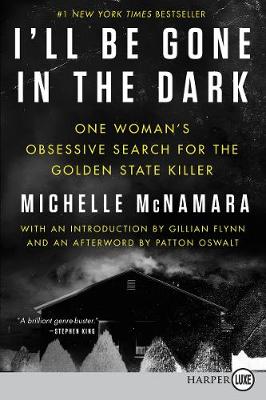Reviewed by clementine on
I’m fully complicit in this, by the way. I’ve indulged in a shared fascination with serial killers since high school. For women, I think so much of it comes down to the idea that brutal murderer has some proximity to our lives, that any one of us has the potential to be the pseudonymous women written about for decades. Our experiences of harassment, assault, violence don’t seem all that far away from the fates of these victims. The idea of serial killers walking among us, undetected for years, possibly being in our orbits, is fascinating. There’s this idea of could-be-me mixed with the relief of knowing that it probably won’t be.
So I understand where McNamara’s fascination comes from, and I do think her writing is evocative and sensitive, straying as far from lurid accounts as possible. But it’s just a feature of the genre, really. And isn’t that part of what makes true crime so appealing, that we know somewhere that there’s an ethical dilemma in commodifying people’s suffering but that we can’t look away? Especially when a book is so meticulously-researched, so well-written that it can easily claim to be above all the rest? (And it is; I don’t think all true crime writing is the same at all, and I think it should err more towards this side of things.) But in the end we’re still finding entertainment in the rape and murder of so many.
This is a compelling book. I read it quickly and enjoyed every page. I recommend it to fans of true crime, especially those who are interested in the meta aspects of the genre. In certain progressive sects of academia it’s becoming common for the author to insert herself into her writing, making herself and her biases known rather than pretending to be writing from an imagined omniscient viewpoint. McNamara does this beautiful, weaving in her own personal narrative with that of the Golden State Killer. We come to understand her motivations for pursuing this case so doggedly, which appear to be relatively “pure”. Her psychological struggles are laid bare, the promise of pursuit followed by the devastation of dead ends. The book is made all the more potent by McNamara’s premature death, the idea of unfinished business and an obsession never fully realized.
I appreciate that McNamara is so even in her writing; she never puts forth wild theories or blames victims. She merely includes what evidence she finds pertinent and compelling. And in the wake of the GSK’s arrest in April, her sharpness becomes apparent. Many of the details that she thought important enough to include in the book turned out to be true. For example, the idea that he was ex-cop or ex-military (he was both), or that he likely grew up in Rancho Cordova. She had an incredible handle on the case, a connection to it that legitimizes the book. It’s not any less fascinating now that GSK has been found; if anything, it’s almost more interesting matching up the details in the book with what we now know.
I wish that McNamara had been able to finish this book, because it does unfortunately peter off and there were elements of repetition and disjointedness. It feels like her team was reticent to revise her work too much, knowing that she was the expert and that their knowledge could never come close. But it could have used some tightening up. However, I think this is an ambitious project well-realized. It’s sure to become a true crime classic.
Reading updates
- Started reading
- 9 November, 2018: Finished reading
- 9 November, 2018: Reviewed
